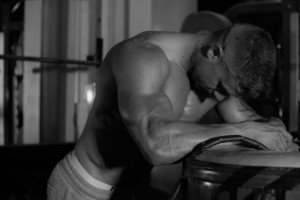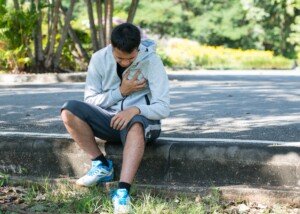
Do you know the many causes of severe dizziness during exercise?
“Exercise can trigger dizziness for number of reasons,” says Jacob Teitelbaum, MD, medical director of the Fibromyalgia and Fatigue Centers nationally, and author of “Beat Sugar Addition NOW!”
“These include, most often, dehydration and salt depletion.”
As a personal trainer I’ve had clients report dizziness during exercise.
These were clients who weren’t in the best of condition, though they didn’t have any known diseases. But at some point during the exercise session, they got dizzy.
One who’s out of shape or not accustomed to some intense exercise may get dizzy simply because their body is not accustomed to the rigorous exercise stimulus.
Often, these clients did not adequately hydrate themselves prior, and/or ate poorly in the hours before the workout, if at all.
I’d work them harder than what they were used to; if they did not have adequate nourishment all day long preceding the workout session, it was no surprise they’d get dizzy at some point along the exercise session.
Another possible cause of dizziness in some people during exercise is the motion during the exercise, like doing pivoting movements in a step class – which involve half-turns and can cause a little dizziness.
Some group fitness classes have 360-degree turns, and these will surely cause an inexperienced person’s head to spin.
Another potential cause of dizziness during exercise: doing something that requires balancing, such as walking on a treadmill without holding onto the machine. I’ve had people inform me that if they let go, “I’ll get dizzy!”
The cure is to let go but walk slowly, so that the body doesn’t sense anything askew.
As the body adjusts, increase the speed while still keeping hands at your sides swinging.
“Less common and more worrisome causes include abnormal angina and abnormal heart rhythms,” says Dr. Teitelbaum. Abnormal heart rhythms (arrhythmias) may also cause fatigue and fainting.
Angina is diminished oxygen flow to the heart muscle due to narrowing of coronary arteries.
Other symptoms of angina are chest pain and shortness of breath brought on by only light exercise (stable angina), or suddenly during rest (unstable angina).
“Problems missed most often by physicians includes autonomic dysfunction like neurally mediated hypotension or POTS (postural orthostatic tachycardia syndrome),” says Dr. Teitelbaum. “These latter two are often associated with chronic fatigue syndrome.”
Neurally mediated hypotension involves low blood pressure, while POTS is when a change in body position causes a big dip in blood pressure, and a fast pulse. These not only may cause some dizziness, but also passing out.
Other possible causes of dizziness while exercising are:
• Meniere’s disease
• PMS
• Pregnancy
• Side effects of medications.
If you get dizzy during your exercise and it isn’t remedied with adequate hydration and eating, as well as avoiding the specific motions that may trigger dizziness like spinning around in a fitness class or doing headstands, an evaluation by a doctor is warranted.

 is a board certified internist and nationally known expert in the fields of fibromyalgia, chronic fatigue syndrome, sleep and pain.
is a board certified internist and nationally known expert in the fields of fibromyalgia, chronic fatigue syndrome, sleep and pain.







































